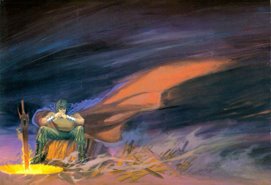Barth: Scripture
An Overview and Evaluation of Karl Barth’s View of Biblical Revelation
Few theologians have exerted a greater influence on the theological scene of the 20th century than the towering figure of Karl Barth. Even so, his view on biblical revelation has often been targeted for criticism from both liberal and evangelical scholars. It would nonetheless be naïve to suppose that neither camp could benefit from the correctives he offered. According to Hunsinger, Barth has “achieved the dubious distinction of being habitually honored but not much read”. The purpose of this assignment is to provide an overview of Barth’s position and an evaluation of his prodigious contributions on the doctrine of revelation.
Historical And Theological Background
Since no theology developed in vacuum, it would be helpful to locate Barthian theology within the historical setting and theological trends that preceded him. By the 19th century, Enlightenment philosophy had seriously challenged the place for religion in the public square. Religious tradition was viewed with suspicion while boundless confidence was placed in the progress of autonomous reason and empirical science. Even reactionary movement like Romanticism, which emphasized self-expression and human feelings against rationalism, still perceive religious dogma and moralistic authority as a hindrance to authentic, individual freedom. As a response, Schleiermacher sought to reconstruct theology as something relevant and essential to human nature itself. The source of theological discourse is expressing human intuition or universal feeling of total dependence on God. Drawing from a pietistic heritage, he tried to show that true religion is “an immediate relation to the living God, as distinct from submission to doctrinal or creedal propositions about God.” By retreating from the domains of science and ethics, theology was secured a safe refuge as an expression of God’s immanence in religious piety. This methodology of doing theology ‘from below’ and resolving conflicts with Enlightenment thought set the trend for liberal theology, in which Karl Barth was trained.  However, these ‘consciousness-theologians’ were not without critics. The 19th century philosopher Ludwig Feuerbach leveled the crippling charge that such theology is anthropology in disguise. The notion of God is merely mental projections of the theologians themselves, making idols in the image of man. Talk about God is in the final analysis veiled discourse about psychology of man, desiring eternal life and perfect happiness. Rather than satisfying imaginary and unattainable desires with religion, would it not be better to focus on attainable needs in the temporal world? Later, Barth would concern himself with answering Feuerbach’s taunt with a theology that starts exclusively with God’s revelation in Christ, ‘from above’ as it were, rather than man’s consciousness.
However, these ‘consciousness-theologians’ were not without critics. The 19th century philosopher Ludwig Feuerbach leveled the crippling charge that such theology is anthropology in disguise. The notion of God is merely mental projections of the theologians themselves, making idols in the image of man. Talk about God is in the final analysis veiled discourse about psychology of man, desiring eternal life and perfect happiness. Rather than satisfying imaginary and unattainable desires with religion, would it not be better to focus on attainable needs in the temporal world? Later, Barth would concern himself with answering Feuerbach’s taunt with a theology that starts exclusively with God’s revelation in Christ, ‘from above’ as it were, rather than man’s consciousness.
Having been a student of liberal theologians like Harnack and Herrmann, Barth was ordained as an assistant pastor at a Reformed Church in 1908. Unfulfilled, he later moved from Geneva to a small parish in Safenwil where the first rumblings of discontent were felt. During the course of his preaching ministry, he found liberal habits of thought unhelpful for ‘the specific minister’s problem, the sermon.’ Studying the Scriptures diligently, Barth began to discover a strange, new world. He wrote, “As ministers we ought to speak of God. We are human, however, and so cannot speak of God. We ought therefore to recognize both out obligation and our inability and by that very recognition give God the glory. This is our perplexity.” Barth’s theology would take seriously the dialectical interaction between our impossibility and necessity of speaking about or for God. Another factor that led to his revolt against liberal theology was the discovery that his former teachers were among 94 German intellectuals who supported Kaiser Wilhelm’s military imperialism . He would later see how easily anthropocentric theology, without a transcendent prophetic message, succumbed to what the Barmen Declaration called “the vicissitudes of the prevailing ideological and political convictions of the day.” Seeing no future for liberal theology, his formidable but latent theological acumen would now be leveled against it.
An Exposition of Barth’s Doctrine of Revelation
Contrary to the heirs of Schleiermacher, we find in Barth the insistence on God’s absolute otherness from any human category or experiences . One cannot speak of God simply by speaking of man in a loud voice. God cannot be seized and made into an object of earthly categories. That does not mean that He is ultimately unknowable. For Barth, the only valid starting point for theological discourse is the claim that the sovereign God proclaims his Word to humankind in three forms of revelation. The divine Word has become incarnate as the man Jesus of Nazareth, and in different senses, took on human form in the prophetic witness of Scripture and in the preaching of the church . Richardson described this Christ-centeredness in this way: “Jesus Christ is the first Word of the word of theology because he is the Word behind the words of Scripture”.







No comments:
Post a Comment